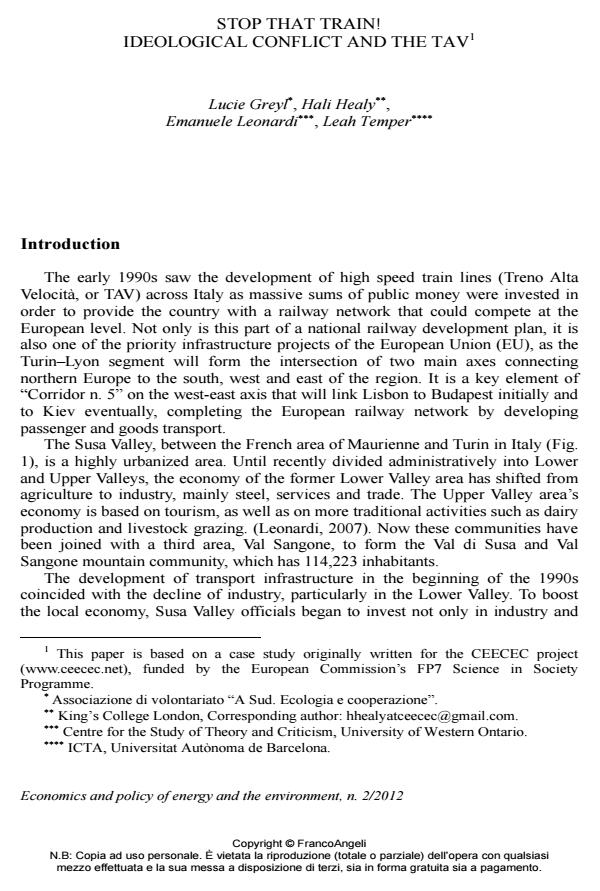Stop that train! Ideological conflict and the TAV
Journal title ECONOMICS AND POLICY OF ENERGY AND THE ENVIRONMENT
Author/s Lucie Greyl, Hali Healy, Emanuele Leonardi, Leah Temper
Publishing Year 2012 Issue 2012/2
Language English Pages 26 P. 193-218 File size 752 KB
DOI 10.3280/EFE2012-002009
DOI is like a bar code for intellectual property: to have more infomation
click here
Below, you can see the article first page
If you want to buy this article in PDF format, you can do it, following the instructions to buy download credits

FrancoAngeli is member of Publishers International Linking Association, Inc (PILA), a not-for-profit association which run the CrossRef service enabling links to and from online scholarly content.
The Susa Valley situated between Maurienne, France and Turin, Italy, has been urbanised by the economic development of the region. Scarred by infrastructure like the Frejus highway, an international railway, and numerous dams, tunnels and industries, this "development" has had significant environmental and social impacts. The high speed train line (Treno Alta Velocità in Italian, or TAV) between Turin and Lyon is planned at the intersection of 2 main European axes to complement the European railway network by increasing the transport of passengers as well as goods. The train would pass through the Susa Valley, via 2 main tunnels and numerous shorter ones to cross the Alps. The "No TAV" movement is the grass-roots movement of the Susa Valley population against the construction of the line. This article, explores the motives and rationale of opponents and proponents, highlighting the role of power relations and an underlying clash of ideologies. It shows how the success and longevity of No TAV movement relies on one hand on the versatility and diversity of its arguments, and on the other, a renewed legitimacy in the context of the current social and economic crises of its arguments in favour of strong sustainability, degrowth and participatory democracy.
Keywords: Transport infrastructure, Political discourse, Material flows, Cost benefit analysis, High speed rail, NIMBY (Not In My Back Yard), Infrastructural Dispositif, Oppositional knowledge, Externalities, Weak sustainability, Degrowth
Jel codes: Z13, D62
- A perspective on radical transformations to sustainability: resistances, movements and alternatives Leah Temper, Mariana Walter, Iokiñe Rodriguez, Ashish Kothari, Ethemcan Turhan, in Sustainability Science /2018 pp.747
DOI: 10.1007/s11625-018-0543-8 - COMMUNITY ACTION: VALUE OR INSTRUMENT? AN ETHICS AND PLANNING CRITICAL REVIEW Luca TRICARICO, in JOURNAL OF ARCHITECTURE AND URBANISM /2017 pp.221
DOI: 10.3846/20297955.2017.1355278 - Complexity and Sustainability in Megaprojects Zahra Shams Esfandabadi, Dario Cottafava, Laura Corazza, Simone Domenico Scagnelli, pp.331 (ISBN:978-3-031-30878-9)
- Protest, Social Movements and Global Democracy Since 2011: New Perspectives Lisa Ariemma, Judith Burnside-Lawry, pp.137 (ISBN:978-1-78635-028-2)
- Towards Sustainable Urbanization. Learning from What’s Out There Alys Solly, Erblin Berisha, Giancarlo Cotella, in Land /2021 pp.356
DOI: 10.3390/land10040356
Lucie Greyl, Hali Healy, Emanuele Leonardi, Leah Temper, Stop that train! Ideological conflict and the TAV in "ECONOMICS AND POLICY OF ENERGY AND THE ENVIRONMENT" 2/2012, pp 193-218, DOI: 10.3280/EFE2012-002009